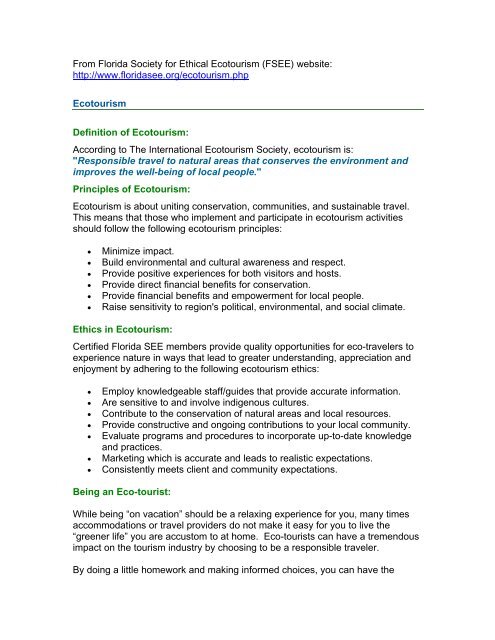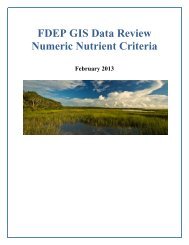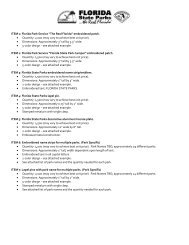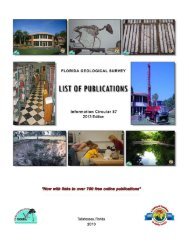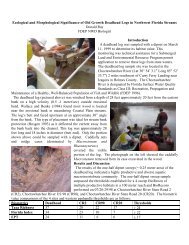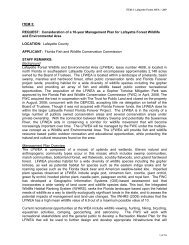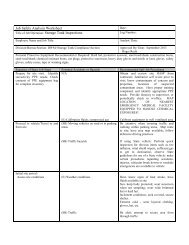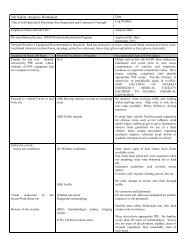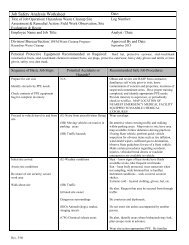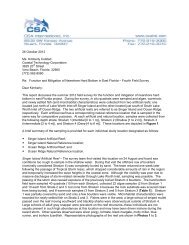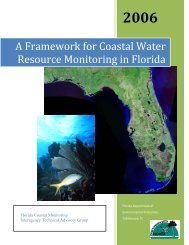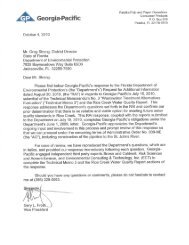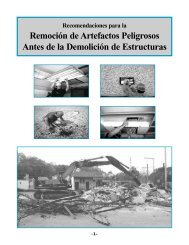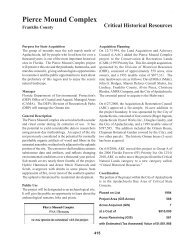Center for Ecotourism and Sustainable Development - Florida ...
Center for Ecotourism and Sustainable Development - Florida ...
Center for Ecotourism and Sustainable Development - Florida ...
You also want an ePaper? Increase the reach of your titles
YUMPU automatically turns print PDFs into web optimized ePapers that Google loves.
From <strong>Florida</strong> Society <strong>for</strong> Ethical <strong>Ecotourism</strong> (FSEE) website:<br />
http://www.floridasee.org/ecotourism.php<br />
<strong>Ecotourism</strong><br />
Definition of <strong>Ecotourism</strong>:<br />
According to The International <strong>Ecotourism</strong> Society, ecotourism is:<br />
"Responsible travel to natural areas that conserves the environment <strong>and</strong><br />
improves the well-being of local people."<br />
Principles of <strong>Ecotourism</strong>:<br />
<strong>Ecotourism</strong> is about uniting conservation, communities, <strong>and</strong> sustainable travel.<br />
This means that those who implement <strong>and</strong> participate in ecotourism activities<br />
should follow the following ecotourism principles:<br />
<br />
<br />
<br />
<br />
<br />
<br />
Minimize impact.<br />
Build environmental <strong>and</strong> cultural awareness <strong>and</strong> respect.<br />
Provide positive experiences <strong>for</strong> both visitors <strong>and</strong> hosts.<br />
Provide direct financial benefits <strong>for</strong> conservation.<br />
Provide financial benefits <strong>and</strong> empowerment <strong>for</strong> local people.<br />
Raise sensitivity to region's political, environmental, <strong>and</strong> social climate.<br />
Ethics in <strong>Ecotourism</strong>:<br />
Certified <strong>Florida</strong> SEE members provide quality opportunities <strong>for</strong> eco-travelers to<br />
experience nature in ways that lead to greater underst<strong>and</strong>ing, appreciation <strong>and</strong><br />
enjoyment by adhering to the following ecotourism ethics:<br />
<br />
<br />
<br />
<br />
<br />
<br />
<br />
Employ knowledgeable staff/guides that provide accurate in<strong>for</strong>mation.<br />
Are sensitive to <strong>and</strong> involve indigenous cultures.<br />
Contribute to the conservation of natural areas <strong>and</strong> local resources.<br />
Provide constructive <strong>and</strong> ongoing contributions to your local community.<br />
Evaluate programs <strong>and</strong> procedures to incorporate up-to-date knowledge<br />
<strong>and</strong> practices.<br />
Marketing which is accurate <strong>and</strong> leads to realistic expectations.<br />
Consistently meets client <strong>and</strong> community expectations.<br />
Being an Eco-tourist:<br />
While being “on vacation” should be a relaxing experience <strong>for</strong> you, many times<br />
accommodations or travel providers do not make it easy <strong>for</strong> you to live the<br />
“greener life” you are accustom to at home. Eco-tourists can have a tremendous<br />
impact on the tourism industry by choosing to be a responsible traveler.<br />
By doing a little homework <strong>and</strong> making in<strong>for</strong>med choices, you can have the
vacation of your dream, while benefiting the environment <strong>and</strong> the local<br />
community. Responsible travel is travel with a purpose. When choosing<br />
destinations, accommodations, <strong>and</strong> tour providers, consider which ones work to<br />
protect the environment <strong>and</strong> benefit local cultures <strong>and</strong> communities.<br />
To help you plan your visit to <strong>Florida</strong>, review on our “Certified Providers” page.<br />
These Ecotour Providers are recognized as preferred service providers who are<br />
committed to using best practices <strong>for</strong> ecological sustainability, natural area<br />
management, <strong>and</strong> quality ecotourism experiences. Enjoy the many experiences<br />
we have to offer along our coast, upl<strong>and</strong>s <strong>and</strong> wetl<strong>and</strong> habitats. Remember that<br />
we are all visitors to these natural ecosystems, <strong>and</strong> with enjoyment comes<br />
responsible behaviors that help keep our “natural heritage” pristine. THANKS <strong>for</strong><br />
your doing your part!
From: A SIMPLE USER’S GUIDE TO CERTIFICATION FOR SUSTAINABLE<br />
TOURISM AND ECOTOURISM, 3 rd . Edition, <strong>Center</strong> <strong>for</strong> <strong>Ecotourism</strong> <strong>and</strong><br />
<strong>Sustainable</strong> <strong>Development</strong> (link below)<br />
Tourism, sustainability, <strong>and</strong> certification<br />
Tourism is an enormous <strong>and</strong> widespread industry. It is found all over the<br />
world, so its impacts, social, economic, <strong>and</strong> environmental, are also<br />
worldwide. These impacts can be positive, doing good, or negative, doing<br />
harm. <strong>Sustainable</strong> tourism usually aims to have minimal negative impacts,<br />
to minimize harm, <strong>and</strong> to optimize economic benefits. <strong>Ecotourism</strong>, a type<br />
of sustainable tourism, is usually conducted in largely untouched natural<br />
areas, which tend to be both environmentally <strong>and</strong> often socially sensitive<br />
(especially if local indigenous groups are involved), so its potential impacts<br />
can be even greater, <strong>for</strong> good or ill. <strong>Ecotourism</strong> aims to extend the positive<br />
impacts, through a special focus on conservation, benefits <strong>for</strong> host<br />
populations, <strong>and</strong> the education of visitors.<br />
Some businesses really achieve these aims, others falsely claim to, <strong>and</strong><br />
some don’t care. Some would like to, but don’t know how. One way of<br />
rewarding the businesses that are truly complying with these goals is by<br />
giving them credible outside recognition. Certification is a tool <strong>for</strong> doing so,<br />
<strong>and</strong> here we describe how it works. The certification process can also<br />
teach businesses about better or exemplary practices, even if the business<br />
never gets certified.<br />
What do we mean by sustainability?<br />
When we talk about “sustainable” activities, it usually means that we can<br />
do the activity in the same or similar way <strong>for</strong> the indefinite future<br />
(sustainable in time) in three main aspects:<br />
• Environmentally – the activity minimizes any damage to the<br />
environment (flora, fauna, water, soils, energy use, contamination,<br />
etc.) <strong>and</strong> ideally tries to benefit the environment in a positive way<br />
(through protection <strong>and</strong> conservation).<br />
• Socially <strong>and</strong> culturally – the activity does not harm, <strong>and</strong> may revitalize<br />
the social structure or culture of the community where it is located.<br />
• Economic – the activity does not simply begin <strong>and</strong> then rapidly die<br />
because of bad business practices; it continues to contribute to the<br />
economic well-being of the local community. A sustainable<br />
business should benefit its owners, its employees, <strong>and</strong> its<br />
neighbors.<br />
When we take these three aspects into account in our activities, this is<br />
called the “triple bottom line”. Sometimes it is referred to as “doing well<br />
by doing good.” It means running a business, an organization, or a<br />
government in such a way that it doesn’t destroy the resources – natural,<br />
cultural, or economic – on which it depends. In fact, a business that is run
in this way can enhance all three aspects<strong>and</strong> continue to operate<br />
profitably, while benefiting its surrounding natural areas <strong>and</strong> communities.<br />
What is sustainable tourism?<br />
The principles of sustainability can be applied to any type of tourism<br />
– mass or specialty; city, beach, or wilderness; large or small. They also<br />
can be applied to all sectors of the tourist industry: lodging, tours,<br />
agencies, ground operators, guiding, <strong>and</strong> transport. According to Agenda<br />
21 <strong>for</strong> the Travel & Tourism Industry, “<strong>Sustainable</strong> tourism products are<br />
products which operate in harmony with local environment, community,<br />
<strong>and</strong> cultures, so that these become the permanent beneficiaries.” Many<br />
sustainable tourism certification programs consider sustainable tourism to<br />
be any kind of “tourism that seeks to minimize ecological <strong>and</strong><br />
sociocultural impacts while providing economic benefits to local<br />
communities <strong>and</strong> host countries.” (Mohonk Agreement, 2000)<br />
A large, conventional city hotel can be environmentally <strong>and</strong> socially<br />
responsible, <strong>and</strong> so can a small ecolodge near a national park. More to the<br />
point, a small lodge can be just as irresponsible <strong>and</strong> unsustainable as a<br />
large hotel, or even more so in some cases. This is one reason why many<br />
people see a growing need <strong>for</strong> internationally recognized, but locally<br />
adapted st<strong>and</strong>ards <strong>for</strong> sustainability.<br />
In tourism, the triple bottom line can be critical, especially <strong>for</strong> those<br />
businesses <strong>and</strong> tours located outside of large cities. Hotels <strong>and</strong> tours in<br />
rural or natural areas depend on the good will of their local community <strong>for</strong><br />
their survival. Businesses that do not hire or benefit local inhabitants often<br />
lose the support of their neighbors. And towns, villages, <strong>and</strong> indigenous<br />
communities whose social fabric is damaged by tourism often lose their<br />
attractiveness <strong>for</strong> tourists. Businesses based on natural resources cannot<br />
survive if the resource is destroyed — this is why the clients are visiting in<br />
the first place.<br />
The twelve aims <strong>for</strong> making tourism sustainable were described in “Making<br />
Tourism More <strong>Sustainable</strong>: A Guide <strong>for</strong> Policy Makers” (United Nations<br />
Environment Programme – World Tourist Organization, 2005) as:<br />
1. Economic Viability: To ensure the viability <strong>and</strong> competitiveness of<br />
tourism destinations <strong>and</strong> enterprises, so that they are able to<br />
continue to prosper <strong>and</strong> deliver benefits in the long term.<br />
2. Local Prosperity: To maximize the contribution of tourism to the<br />
economic prosperity of the host destination, including the proportion<br />
of visitor spending that is retained locally.<br />
3. Employment Quality: To strengthen the number <strong>and</strong> quality of local<br />
jobs created <strong>and</strong> supported by tourism, including the level of pay,<br />
conditions of service <strong>and</strong> availability to all without discrimination by<br />
gender, race, disability or in other ways.
4. Social Equity: To seek a widespread <strong>and</strong> fair distribution of<br />
economic <strong>and</strong> social benefits from tourism throughout the recipient<br />
community, including improving opportunities, income <strong>and</strong> services<br />
available to the poor.<br />
5. Visitor Fulfillment: To provide a safe, satisfying <strong>and</strong> fulfilling<br />
experience <strong>for</strong> visitors, available to all without discrimination by<br />
gender, race, disability, or in other ways.<br />
6. Local Control: To engage <strong>and</strong> empower local communities in<br />
planning <strong>and</strong> decision making about the management <strong>and</strong> future<br />
development of tourism in their area, in consultation with other<br />
stakeholders.<br />
7. Community Wellbeing: To maintain <strong>and</strong> strengthen the quality of life<br />
in local communities, including social structures <strong>and</strong> access to<br />
resources, amenities <strong>and</strong> life support systems, avoiding any <strong>for</strong>m of<br />
social degradation or exploitation.<br />
8. Cultural Richness: To respect <strong>and</strong> enhance the historic heritage,<br />
authentic culture, traditions, <strong>and</strong> distinctiveness of host<br />
communities.<br />
9. Physical Integrity: To maintain <strong>and</strong> enhance the quality of<br />
l<strong>and</strong>scapes, both urban <strong>and</strong> rural, <strong>and</strong> avoid the physical <strong>and</strong> visual<br />
degradation of the environment.<br />
10. Biological Diversity: To support the conservation of natural areas,<br />
habitats, <strong>and</strong> wildlife, <strong>and</strong> minimize damage to them.<br />
11. Resource Efficiency: To minimize the use of scarce <strong>and</strong> non<br />
renewable resources in the development <strong>and</strong> operation of tourism<br />
facilities <strong>and</strong> services.<br />
12. Environmental Purity: To minimize the pollution of air, water, <strong>and</strong><br />
l<strong>and</strong> <strong>and</strong> the generation of waste by tourism enterprises <strong>and</strong> visitors<br />
The publication explains how these aims are related to the triple bottom<br />
line <strong>and</strong> how each of the aims contributes to all three bottom lines.<br />
What do we mean by ecotourism?<br />
<strong>Ecotourism</strong> is a sector of tourism, based on nature travel <strong>and</strong> including the<br />
principles of sustainability. The International <strong>Ecotourism</strong> Society (TIES)<br />
defines ecotourism as: “responsible travel to natural areas that<br />
conserves the environment <strong>and</strong> improves the welfare of local<br />
people.” Whatever definition is used, ecotourism should have a positive<br />
impact on both natural areas <strong>and</strong> the local community.<br />
http://www.ecotourism.org/sites/ecotourism.org/files/document/Certificatio<br />
n/<strong>Ecotourism</strong>%20H<strong>and</strong>book%20I%20-<br />
%20A%20Simple%20User%27s%20Guide%20to%20Certification%20<strong>for</strong>%20Sustai<br />
nableTourism%20<strong>and</strong>%20Ecotou.pdf


